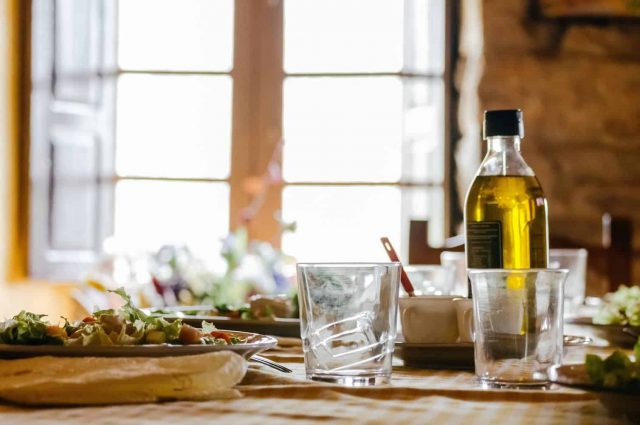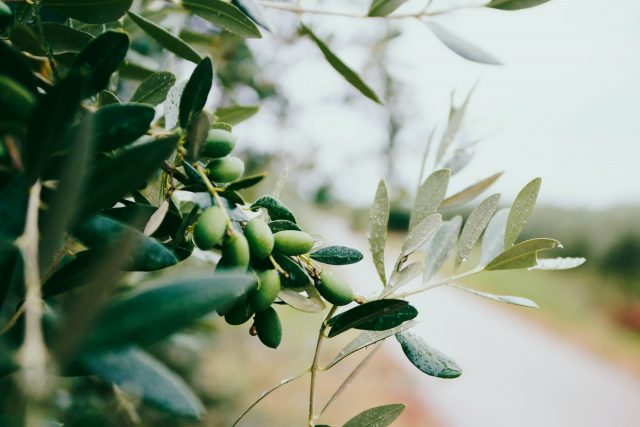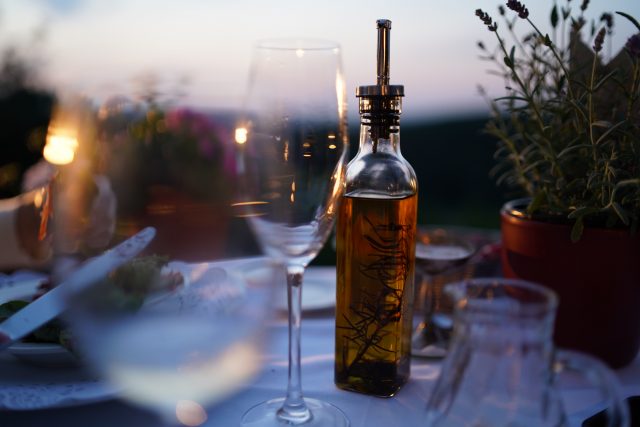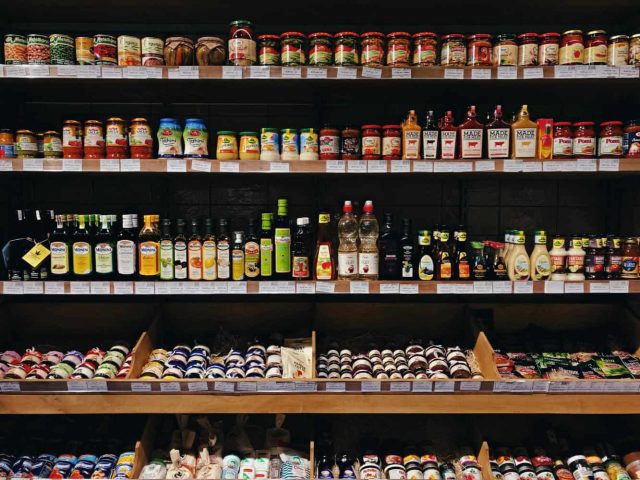
Olive oil is essentially a pressed fruit juice, and unlike a bottle of fine wine its quality does not improve with age. Yes, olive oil can go bad.
Experts say that rancid olive oil is commonplace in American kitchens. Many families have become so accustomed to this expired flavor that they now prefer it. Most of us have trouble distinguishing the quality of an olive oil, or understanding if and why it went bad.
Why does olive oil go bad?
The short answer is that light, heat, and oxygen exposure cause olive oil to go bad. These factors cause oil to deteriorate quickly, regardless if it is sitting in your kitchen, on a store shelf, or in a distributors warehouse.
According to the Olive Oil Times, temperature exposure causes the fresh flavors and aromas of an oil to change quickly into unpleasant ones. Heat causes free fatty acids to rise quickly and rancidity to develop.
The more oxygen and light your oil is exposed to, the more rapidly the complex flavors will deteriorate and become rancid. Most manufacturers use dark glass packaging to help slow this process.
It is impossible to avoid light, heat and oxygen exposure in the real world. And the longer you hold onto a bottle of oil the more it will break down. There’s really nothing you can do to stop this process from happening over time, but there are a few simple steps you can take to pick a fresh bottle, use it before it deteriorates, and identify when it has gone bad.

How do you know if olive oil has gone bad?
When olive oil becomes rancid, the smell and taste profile will change. It’s easy and safe to test your oil in a few simple steps.
First, pour 1/2 teaspoon of olive oil into a small container like a dish or bowl. A soy sauce dish is the perfect size, but really any open container should do the job.
Smell deeply from 4” to 6” above the dish. Fresh olive oil should smell like ripe olives and perhaps slightly bitter, peppery, or grassy. Rancid oil is often characterized by the smell of crayons, putty, glue, fermented fruit, or even old fish. These odors are derived from spoiled fats.
Next, taste a small amount of the oil and let it roll across the surface of your tongue. If there is rancidity then you are likely to taste crayon and old peanut flavors in the sample. You may also recognize a sensation of greasy residue in your mouth.
Any bitterness you may encounter when tasting the oil is actually considered a positive characteristic, indicating freshness. Bitter oils with sharp or fruity flavors are highly regarded by industry professionals.
Is rancid olive oil bad for you?
Rancid olive oil is not explicitly unhealthy, but many of the pro-health properties deteriorate quickly as oil oxidizes. You also lose peak flavor as oil becomes rancid.
Rancidity is caused by the breakdown of healthy monounsaturated fats found in olive oil. If you’re using old oil then you are missing out on the benefits they provide. Monounsaturated fats can help with weight loss, decrease in inflammation, and reduced risk of heart disease.
There is an abundant supply of antioxidants in olive oil, including tocopherols, β-carotene, lutein, squalene, lipophilic and hydrophilic phenols. These compounds can protect your body’s cells from the damage of free radicals, so long as your oil is fresh. Olive oil quickly loses antioxidants as it oxidizes.

How long does olive oil last?
Olives are processed shortly after harvest, and extra virgin olive oil can remain good for up to two years afterward if bottled and stored properly.
In most cases the “best by” date provided on your bottle is set based on the bottling date rather than the time of harvest. This can be misleading since some oil is not always bottled immediately after processing. Whenever possible, seek an oil that clearly labels when the olives were harvested. Look for the most recent harvest.
Once you’ve broken the seal on a bottle of olive oil, the Olive Center at UC Davis recommends it’s best to finish it in about six weeks. The freshness will diminish over time, losing flavor and health properties. It is likely that rancidity will be apparent by 60 days.
How to store olive oil so it doesn’t go bad.
Heat, light and exposure to the open air will accelerate the demise of a fresh olive oil. Keep your bottle in a cool dark place where it can remain well-sealed, preferably between 65-75 F.
Consider making space in a dark cabinet or pantry for your oil. Avoid storing it near a stove or other heat source. Even the heat and UV rays from direct sunlight can cause the quality of an oil to quickly decline.
Olive oil will solidify at colder temperatures, so it is not recommended that you store it in the refrigerator. Chilling doesn’t damage the oil, but it can make things inconvenient when you need oil and your bottle is stuck in the form of a dense goo.
Maybe the most effective way to keep your olive oil fresh is to use it. Don’t buy expensive oil only to save it for a special occasion. It’s going bad from the moment you open the bottle.
If you need encouragement to use more than a tablespoon here and there, keep in mind that in Greece the average person consumes 6.3 gallons of olive oil per year. It’s delicious and healthy, especially when compared with other popular oils today so don’t be shy.
In our kitchen we like to keep our monthly bottle of olive oil in a dark cupboard, and a smaller serving bottle with a drizzler top closer-at-hand for daily consumption. We refill the serving container periodically and use it quickly, while the larger supply stays safely sealed.
Does olive oil go bad when heated for cooking?
If long-term heat exposure can damage your olive oil, you might wonder what happens when you cook with it.
While several non-stick cookware manufacturers claim the smoke point of olive oil is too low for their products, the North American Olive Oil Association disagrees. According to their recent study, smoke point is not the best predictor of stability for home cooking. The research suggests that the heavy concentration of antioxidants and phenols found in pressed olives contribute to exceptional stability when compared with other vegetable oils. A report from the American Chemical Society corroborates that extra virgin olive oil retains most of its nutritional properties when heated at stove top temperatures for an extended period.
Practically speaking, you may lose some delicate flavors when cooking with olive oil, but it’s unlikely that your oil will sustain any real nutritional damage in the process.
How to dispose of old olive oil.
Buying recently harvested oil in a quantity that you can consume before it expires will go a long way toward limiting the amount of expired oil you have to deal with. Even so, every home chef will need to dispose of old oil at some point. If you’ve ever moved or done spring cleaning then you probably know a situation where this happened to you.
Do not pour old oil down the drain.
A common mistake made by many is to simply pour expired oil down the drain. This is a bad idea. Fats, oils, and greases are some of the most common causes of clogged pipes under a kitchen sink.
Liquid olive oil and other vegetable oils may look harmless when going down the drain, but they can build fatty residue inside your pipes. This coating can build up over time and cause a severe blockage.
Not only can drained oil be bad for your plumbing, if it hits the water table then it can do environmental damage as well.
Putting olive oil in the trash.
Though there are more sustainable options that I’ll mention below, this may be the easiest way to dispose of old olive oil. If you are disposing of used oil, be sure that it is cool before moving into your trash can to avoid starting a fire.
Place your oil in a sealed non-breakable container before adding to the trash can. Do not simply pour it in a trash bag or can. This can attract undesired rodents and will make a big mess if the bag is ripped. Plastic containers with a sealable top, like a peanut butter jar, are an easy storage option to avoid making a mess.
Composting olive oil is complicated.
Many experts recommend against composting your cooking oil because it can be difficult for an inexperienced composter to get it right. According to the Worm Monger composting site, oil is more complex to break down than raw fruits and vegetables. It requires extra heat, and can lead to problems like rot and rodents if done improperly. Ultimately, adding too much oil to a compost pile that isn’t prepared for it can kill the compost.
It is possible to recycle cooking oil in some areas.
Olive oil can be recycled into biofuel, which is a clean burning alternative to diesel for many applications. Not all areas have a program that will accept oil, but it’s easy to locate if there is a facility in your area through the Earth911 search tool.
Creative and thrifty? Consider reusing old oil outside of the kitchen.
If you are so inclined, DIY experts claim there are a variety of uses for old olive oil outside of the kitchen. We’d rather just use it for cooking before it goes bad, but if you are looking to get thrifty and creative there may be options to use your old oil for beauty and household applications.

Things To Remember
Light, heat and exposure to oxygen are all factors that cause olive oil to go bad. If you allow your oil to go unused over time it’s inevitable that your bottle will eventually deteriorate and become rancid.
To keep fresh oil in your kitchen, focus on the simple factors that you control.
Buy olive oil that lists the harvest date on the bottle. Pick a bottle from the most recent harvest. Olives are picked and pressed in the Northern hemisphere between October – December, and in the Southern hemisphere from May – July. If unopened, extra virgin olive oil has up to a 2 year shelf life from the month it was picked and pressed.
Once you’ve opened a new bottle of olive oil, use it within 60 days. The sharp fruit flavors of the oil and several of its health benefits will begin to deteriorate quickly after opening and are significantly diminished by 6-weeks after opening.
Seal and store your bottle in a cool dark place to minimize exposure to oxygen, heat, and light. All of these factors contribute to the oxidation and overall deterioration of the oil.
And most importantly, be sure to enjoy your oil. When you buy a nice bottle of fancy oil, don’t stash it away from special occasions. Once you open it, the oil will never be as delicious as it is today.
Bon appetit!
Author Bio
David Lewis is the founder of Kitchen Ambition, a resource site for home chefs and those in pursuit of the perfect kitchen. He resides in the American South.

[Sources] Original Post URL https://www.kitchenambition.com/does-olive-oil-go-bad/
Pictures are all available on an open license via Unsplash.
https://www.kitchenambition.com/wp-content/uploads/2020/07/juan-gomez-sE6ihVGSd1Q-unsplash-1024×679.jpg
https://www.kitchenambition.com/wp-content/uploads/2020/07/dimitri-karastelev-57ZxBOMkT5E-unsplash-1024×683.jpg
https://www.kitchenambition.com/wp-content/uploads/2020/07/nazar-hrabovyi-lIuxlN0zSjs-unsplash-1024×683.jpg
https://www.kitchenambition.com/wp-content/uploads/2020/06/edgar-castrejon-bG5rhvRH0JM-unsplash-1024×683.jpg
https://www.kitchenambition.com/wp-content/uploads/2020/07/daria-volkova-BMnX7L9G5xc-unsplash-1024×768.jpg
